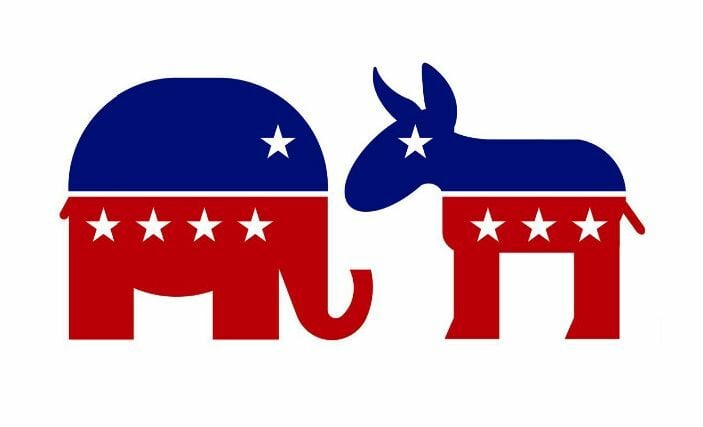US Election 2024 tracker: Live news and election updates

For the latest news, updates, and insights on the highly anticipated 2024 United States Presidential Election, look no further. As the race for the White House heats up, we bring you the most comprehensive and up-to-date information on the candidates, their policies, and the key issues shaping the election landscape. Stay informed and engaged with the world of American politics as we gear up for another pivotal moment in the nation’s history.
The 2024 US Presidential Election promises to be a significant event, with potential candidates from both major parties vying for the opportunity to lead the country. We cover a wide range of topics, including candidate profiles, campaign strategies, policy proposals, debates, and polling data. We also delve into the critical issues facing the nation, such as the economy, healthcare, national security, and social justice, providing you with a complete understanding of the factors influencing the election.
Whether you are a political enthusiast or a casual observer, our live feed offers a balanced and comprehensive view of the 2024 US Presidential Election. Stay tuned for the latest developments, breaking news, and in-depth analysis of the candidates and the issues that matter most to the American people. With our user-friendly interface and easy navigation, you can effortlessly stay updated on all aspects of the election.
So, bookmark this page, and let us be your go-to source for all the latest news and updates on the 2024 United States Presidential Election. Stay informed, stay engaged, and stay connected with the world of American politics.
Recurring federal investigations and their impact on senator Bob Menendez's political career
Rumblings from New Jersey's political landscape indicate a familiar pattern: recurring federal investigations involving Senator Bob Menendez. The 69-year-old senator, born to Cuban immigrants and hailed as the quintessential "survivor" of politics, is once again under federal scrutiny. This time, he shares the spotlight with his wife as they are examined for potential ties to a company that bagged an exclusive contract for certifying meat exports to Egypt, despite having no substantial experience in the sector.
Reputed as the never-say-die political figure, Menendez navigated a string of similar investigations in the past two decades. He consistently attributes his frequent entanglements with federal authorities to his humble beginnings and steadfast rise to his current influential position. His numerous brushes with formal investigations have done little to deter his supporters or sever his strong influence in the Democratic party.
His most recent legal ordeal was a string of federal charges for an alleged bribery scheme that resulted in a hung jury. Yet, party members rallied around him, and he came out unscathed. However, this ongoing investigation bears different implications, especially with the senator's reelection due in the coming year.
Amid uneasy anticipation, whispers of ambitious North Jersey Democrats, ready to seize any sign of weakness, pepper political circles. Menendez, known for his tenacity and determination, has already announced his intention to run for reelection, despite the ongoing investigations. The gravity of his influence and the reluctance to undermine a strong political figure keeps the political machine from pushing him into the shadows.
The senator's hardscrabble narrative of Cuban immigrant roots and his rise in the political ranks has always been a point of interest. From joining the school board in Union City with Mayor William Musto's backing in 1974 to his subsequent role as board secretary, Menendez's political career has been a journey of continual advancement. His resume showcases stints as mayor, state assembly member, state senator, and U.S. House of Representatives member before attaining his current role as a U.S. senator representing New Jersey.
His political success was punctuated with notable federal investigations. His first brush with federal scrutiny came in 2006, spearheaded by then-New Jersey U.S. Attorney Chris Christie, pertaining to rental records between Menendez and a nonprofit organization. Following this, allegations of connections to a wealthy Florida eye doctor that culminated in Menendez and the doctor's indictment in a separate bribery scheme emerged in the run-up to his 2012 reelection campaign. Though the backlash from his legal battles took a significant political toll on Menendez, he triumphed against former pharmaceutical executive Bob Hugin in the 2018 general election.
Today, yet another investigation looms in the background, led by the U.S. Attorney's Office of the Southern District of New York. Although specifics remain elusive, news reports suggest a primary focus on New Jersey-based company IS EG Halal's procurement of an exclusive contract for certifying meat for the Egyptian government.
These circumstances paint an uncertain picture for Menendez's impending reelection campaign. Despite this, he continues to enjoy significant political influence in his home state. His son, Rob Menendez, recently faced undeterred success in his campaign to replace retiring U.S. Rep. Albio Sires in New Jersey's safely Democratic district. This strong support for the Menendez family in political circles lends a unique steadfastness to the senator's controversial profile.
The recurring investigations continue to brew speculation about politically motivated prosecutions. Hudson County Commissioner Bill O'Dea, a staunch Menendez supporter, suggests that the senator's defiance against foreign policies of his own party might be fueling these legal ordeals.
Despite uncertainty around the ongoing investigation, no one can deny Menendez's indomitable influence on New Jersey's political scene and the Democratic party. But the narrative of his continuous survival amidst recurring federal scrutinies poses a question: Will New Jersey's political "survivor" weather yet another storm of federal investigation? Only time will tell.
Newcomer Mark Houck challenges incumbent Brian Fitzpatrick in Pennsylvania's 1st congressional district race, bringing abortion rights to the forefront
While Democrats aim to unseat Republican representative Brian Fitzpatrick in Pennsylvania in 2024, newcomer Mark Houck, an anti-abortion activist, poses a primary challenge from the right. This first-time candidate recently joined the race for the 1st congressional district of Pennsylvania, making the forthcoming primary a potential hotbed of debates centering around abortion rights. Notably, Houck presents a strong contrast to Fitzpatrick, a Congress member known for his bipartisanship, especially since their district is crucial for Republicans to maintain congressional majority in the upcoming elections.
Houck, who was absolved of criminal charges following a dispute with an abortion clinic escort, expressed his rigid positioning against abortion access and exceptions in cases of rape and incest during a recent radio interview. His unequivocal stance stems from his faith and the belief that the unborn child is an innocent party in such tragic situations.
However, in the wider scope of general elections, hardline opposition to abortion access can be disadvantageous. It's believed that the topic of abortion rights significantly influenced crucial past races, including those in Pennsylvania. In addition, radio host Dom Giordano shared his skepticism about Houck's strict views on abortion winning favor among the electorate in Bucks County, a critical segment of the congressional district.
Despite the hurdles that this issue might present, Houck, although a newcomer, has demonstrated fundraising prowess and drawn attention due to the highly publicized abortion clinic incident. Following his arrest by the FBI in connection with the clinic altercation, Houck raised upwards of $400,000 via GiveSendGo, an alternative to the popular GoFundMe platform, for his legal defense. Upon his acquittal earlier this year, his lawyer stated that the case was a mere attempt by the justice department under President Joe Biden's administration to intimidate anti-abortion activists.
However, the Congressional Leadership Fund, a super political action committee allied with House Speaker Kevin McCarthy, projects confidence in Fitzpatrick's chances of victory in the forthcoming primary. They emphasize his past electoral successes and their belief that the abortion issue will not be a decisive factor in the race. Notably, Fitzpatrick has overcome past right-wing challenges, securing about two-thirds of votes in the primary and 54% in the general election in the previous electoral cycle.
Nevertheless, the Democratic party could leverage Houck's candidacy to portray the Republican party as extreme due to their stance on abortion rights, a tactic that proved successful during the midterms and which the Democratic Congressional Campaign Committee plans to deploy in 2024.
Fitzpatrick, a moderate in the Republican delegation, faces an uphill battle against such so-called hardline pro-lifers in his district, as per seasoned Republican strategist Christopher Nicholas. Still, Nicholas predicts a spirited bid from Houck but is less optimistic about his chances of unseating incumbent Fitzpatrick, citing the political graveyard of past unsuccessful primary challengers.
Michael Cohen considers running as a Democrat for Manhattan congressional district after prison term
Michael Cohen, the former attorney for Donald Trump who later became his critic, confirmed his possible bid for the deep-blue Manhattan congressional district. After serving more than a year in jail for campaign finance violations and fraud, Cohen is contemplating running as a Democrat for New York's 12th congressional district, currently held by Representative Jerry Nadler. However, challenging the 31-year term of Nadler may prove to be difficult due to his longstanding presence and vast support from powerful Jewish communities within his district.
The news about Cohen's potential candidacy was initially broken by Semafor on Thursday evening. For over a decade, Cohen was closely associated with Trump, working in the Trump Organization, Trump's 2016 campaign, and the Republican National Committee (RNC). His sentencing to federal prison clouded his career in December 2018 when he admitted to campaign finance violations and related offences committed during his tenure with the former president.
The charges against Cohen were related to hush money, which he acknowledged as having paid to adult film star Stormy Daniels under Trump's guidance. This controversy resulted in a New York state indictment against Trump. Cohen testified to the grand jury prior to its making its charges, indicating that his role will be instrumental in the forthcoming trial.
The conviction led Cohen to being disbarred and, post his prison sentence, he emerged as a critic of Trump. Even though he had worked for Trump, he had, throughout his life, volunteered and worked for various Democrats. Consequently, after his prison term, he registered as a Democrat, said his attorney.
The 12th congressional district of New York, having been redefined last year to now include the Upper East Side and Upper West Side of Manhattan, is among the wealthiest regions of the country. In a rare showdown in the primary last year between two House committee chairs, Nadler handily defeated former Representative Carolyn Maloney after their districts were merged.
Why political aspirants are drawn to the Iowa state fair: Understanding the tradition of the Iowa caucuses
Every quadrennial cycle, potential future leaders of America congregate in Iowa to participate in quintessential state fair activities. This includes everything from flipping pork chops to delivering speeches, all under the sweltering August weather. The sequence of events for this year's fair commenced yesterday and will continue until August 20. But what exactly draws political aspirants to this renowned fair in Des Moines, Iowa? The answer lies in the decades-old tradition of the Iowa caucuses.
From the 1970s, when the Iowa caucuses formally began, the state fair provided a wholesome platform for diplomacy at the grassroots level. In addition, it offers potential leaders an opportunity to engage with a diverse range of voters, numerous of whom typically do not attend political gatherings.
These Iowa caucuses give voters their first official means of expressing support for primary candidates, thereby indicating the potential path of the political race in the rest of the nation. However, this long-standing tradition appears to be dwindling on the side of the Democratic party. It has been suggested that President Joe Biden will easily secure renomination. Furthermore, the Democratic National Committee has demoted Iowa from its privileged position as the first caucus state. Critics, primarily Democrats, have questioned the representativeness of a state whose population is 90% white. Yet, this concern is not shared by the GOP. The upcoming 2024 caucuses are scheduled for January 15.
For aspiring leaders who have not managed to qualify for the Republican primary debate stage later this month, the Iowa State Fair provides a chance to catch voters' attention and distinguish themselves from competitors. For instance, candidates with national polls below 1%, such as Asa Hutchinson, Perry Johnson, Francis Suarez, Will Hurd, and Doug Burgum, are all set to make their presence felt at this year's fair. Others, including Donald Trump, Ron DeSantis, Mike Pence, Vivek Ramaswamy, Marianne Williamson, Robert F. Kennedy Jr. and Nikki Haley, have also confirmed their attendance.
However, the intense spotlight at the Iowa State Fair can at times be unforgiving. Potential leaders sometimes find themselves haunted via campaign-damaging incidents. A case in point is the 2011 fair, during which presidential candidate, Mitt Romney, uttered the controversial phrase "corporations are people"—a statement that stirred criticism for being disconnected from regular Americans.
The fair, drawing around a million visitors annually, provides an extensive and diverse audience for candidates to interact with voters. In 2019, Pete Buttigieg, a former presidential aspirant, utilized the fair to connect with voters, consuming copious amounts of food in the process. This festival of food included root beer floats, pork chops on a stick, fried bacon ball BLTs, and deep-fried Oreos.
Back in 2015, Donald Trump took a unique approach, using his helicopter to take children on rides around the outskirts of the fairgrounds. And in 2012, former President Barack Obama made a significant impact by closing a beer tent, leading to an alleged loss of thousands of dollars for the business. Despite this, his appearance, accompanied by chants of "four more beers," was memorable amongst the cheering voters.
The fair also includes the Des Moines Register's Political Soapbox—an opportunity for candidates to present their campaign propositions and respond to voter inquiries. This year, 13 different candidates will offer 20-minute speeches. In a similar vein, Iowa Governor Kim Reynolds will host "fair-side chats" with GOP presidential candidates throughout the 11-day fair.
Progressive group aims to leverage abortion rights momentum for Democrats' advantage in Arizona election
A prominent progressive organization is looking to capitalize on the momentum generated by the Democrats through their achievements in abortion-related ballot initiatives. The next target is Arizona, a fiercely contested state in the Southwest. The ambition is driven by the recent 14-point victory in Ohio and the aim to secure abortion rights after the fall of Roe v. Wade. It's important to note that abortion after 15 weeks of pregnancy is currently illegal in Arizona.
According to a memo from the progressive organizing group Indivisible, national Democratic donors and stakeholders should pay close attention to Arizona, as it may offer a significant return on investment for placing abortion on the ballot. The memo encourages Democrats to harness the ongoing backlash from the Supreme Court's 2022 decision in Dobbs v. Jackson Women's Health Organization. Utilizing this momentum, they could triumph in crucial swing states in 2024. This alone, in a challenging Presidential year, could give the rest of the Democratic ticket the boost it needs.
The introduction of a ballot initiative in Arizona could maximize the turnout of pro-choice voters, thereby strengthening Democratic candidates at the Presidential, Senate, House, and state legislative level. The continued relevance and urgency of this issue, in the ongoing post-Roe environment, were emphasized by the Acting Co-Executive Director of the group, Mari Urbina.
Arizona is anticipated to be a defining state in the next presidential election, following on from the 2020 election, which was marginally won by President Joe Biden- the first Democrat to seize the state since 1996. Biden made a visit to the state on Tuesday and designated the area around the Grand Canyon as a national monument, safeguarding 1,500 square miles of land.
The Republican party in Arizona faces the challenge of maintaining two-seat majorities in both legislative chambers. Combined with the crucial Senate race and the conflicting House districts, the stakes are high for the Grand Canyon State. Indivisible also highlighted recent poll data to suggest that Arizona has a strong pro-choice sentiment that transcends party politics, implying that this could influence the outcome of tight contests in the upcoming year.
The group cited a national survey by CNN showing that abortion rights remain a priority for voters, with 64% expressing their disapproval for the Supreme Court's overturning of Roe. This figure, which includes the 50% who 'strongly disapprove,' remained consistent with another CNN survey from July 2022. This indicates that the public's opinion on the matter has remained steady.
In 2022, efforts to implement an archaic, pre-statehood law which would effectively ban the procedure completely were unsuccessful. This came after the Supreme Court ruling rendered abortion illegal after 15 weeks. A significant grassroots effort, involving the collection of 175,000 signatures, attempted to qualify for the 2022 midterm ballot, but time constraints meant that only half of the required signatures were collected.
Activists plan to renew their efforts for 2024, with renowned national abortion rights groups like ACLU, Planned Parenthood, and NARAL pledging their support. These groups, and additional ones, have stated their intention to back a new political committee, Arizona for Abortion Access. This committee aims to run a ballot initiative campaign for 2024, presenting an amendment language for the Constitution that could feature on the November 2024 ballot.
Indivisible's memo mentioned the intention of its volunteers to accumulate "tens of thousands of signatures" for the abortion ballot measure. Urbina reaffirmed the group's commitment to rallying its volunteer base and acknowledged the unifying potential of this issue for Democrats, independents, and citizens of Arizona.
GOP's strategy for securing Congress majority in 2024 hinges on blue states, reveals super PAC memo
As part of a strategy to secure a majority in congress in 2024, the leading GOP super PAC has informed its donors that victory hinges on supporting blue states, a memo revealed. The Congressional Leadership Fund, in close association with House Speaker Kevin McCarthy, noted that roughly one-third of all swing seats are located in traditionally blue states. With only a majority of four seats in Congress, the Republicans will need to safeguard 13 seats located in the strongly Democratic New York and California regions if they hope to maintain their governance past 2024.
To further this cause, the CLF has initiated the "Blue State Project" which is designed to boost support in traditionally Democratic states. "We are able to tap into the dissatisfaction of moderate voters in liberal states who are seeking sensible governance," states the memo. "The significant gains we've achieved in NY and CA over the past four years are not accidental, yet this implies we are facing significantly costly battles in the future, with 11 incumbents targeted in the NYC and LA media markets alone."
Some Republicans acknowledge that as the presidential year commences, the issues that they need to prioritize are not exactly the ones that their base typically rallies behind. The memo pointed out to the donors that swing-voters in blue states differ from those in swing states. Republicans aim to blame Democratic leaders for issues such as elevated living costs and crime rates, both factors which played pivotal roles in New York's last election cycle. In that race, the Republicans managed to flip four seats and Lee Zeldin almost secured an astonishing upset win against Democratic Governor Kathy Hochul.
Despite this, Republicans in blue states are at a disadvantage with regards to party infrastructure, according to the CLF. They have asserted the need to build infrastructure that focusses on reaching voters who are prone to vote across parties, establish strong field programs for voter engagement, and also invest in early voting, which has been advised against in previous cycles.
The memo also highlighted that early funding will be necessary to reserve television screentime in these tendentiously more expensive markets during the presidential year, which will invariably contribute to increased rates.
Besides guarding GOP gains in deeply Democratic states, the Congressional Leadership Fund has also identified offensive tactics to invest in. They begin with the open seats currently held by Elissa Slotkin of Michigan, and Abigail Spanberger of Virginia. Additionally, they have plans to back challengers in the seven seats held by Democrats that were won by Donald Trump in 2020.
The memo also specifically targeted two vulnerable Democrats in Pennsylvania, namely Susan Wild and Matt Cartwright, citing insufficient candidate quality at the top of the ticket as being the reason for their victories. "Their reputations are damaged, and they are strapped for cash following the previous cycle. They are up for a serious challengers," stated the memo.
National Republicans were relieved at the announcement that Doug Mastriano will not be running for Senate this year. They still anticipate and hope that David McCormick, their top prospect, will enter the race.
The CLF struck an optimistic tone in their memo, expressing confidence in its odds to expand the Republican majority. It was pointed out that GOP-targeted members have raised more funds and have more cash on hand compared to the Democrats, along with the widespread unpopularity of Democratic President Joe Biden in public polls. The memo concludes by saying, "With a little over 15 months until Election Day, we have a robust opportunity to maintain and grow the majority and record a third-consecutive victory cycle."
Rosendale's potential Senate run in Montana could disrupt GOP's strategic plans
Senior Republicans aimed to dodge a challenging primary in Montana's Senate race by convincing GOP Rep. Matt Rosendale, who is 61 years old, to remain in the House. However, these efforts are not proving effective as Rosendale, who suffered a defeat in the 2018 Senate bid seems to be edging closer to another statewide chase. He has recently hired a notably connected fundraiser and is attempting to secure support from leading conservatives. In addition, he is aiming to dispel any doubters following the Club for Growth's retraction of an earlier plan to support his bid.
Rosendale has yet to publicly announce a decision regarding the Senate run. Nevertheless, the private actions he is currently undertaking could potentially interfere with his party's meticulously structured strategy to replace Sen. John Tester, who is among the Senate's most vulnerable Democrats.
Hoping to pave the way for Tim Sheehy, a Navy SEAL-turned-business executive, the GOP leaders initiated a detailed campaign to sideline Rosendale. They feared that Rosendale may win in a primary, thanks to his statewide notoriety. However, they were wary that he may once again lose in a general election against Tester. With a Senate deficit that is worryingly slim, achieving success in Montana forms a vital link in the GOP's expansive 2024 strategy.
Rosendale's actions, however, indicate that he is not swayed. In a recent development, he recruited Caroline Wren, who previously worked on the Trump campaign. She currently fundraises for conservative candidates including Kari Lake in Arizona. Rosendale spent his summer attending functions in Kalispell, Bozeman, and Polson. Interestingly, all these locations fall under the jurisdiction of Rep. Ryan Zinke, who has given his endorsement to Sheehy. This suggests that Rosendale has set his sights on a statewide role.
Recently, goodwill messages and encouragement from several conservative individuals flooded social media platforms. Among these voices were leading conservatives such as Sens. Rand Paul and Mike Lee along with members of the House Freedom Caucus. He was also guaranteed leverage from allies such as Jim DeMint and members of various affiliated groups including Heritage Action and Turning Point Action. The PAC Senate Conservatives Fund, which was started by DeMint, is anticipated to support Rosendale should he join the race.
Aashka Varma, a key aide to the congressman, acknowledged Rosendale's popularity amongst local voters. On the other hand, she did not shy away from criticizing Sheehy on the subjects of diversity, equity and inclusion programs. She also condemned his views on environmental, social, and governmental investment which are the two contentious subjects within the party's right flank.
Rosendale's desire to run for a statewide bid intensified after he attended a fundraising event in Kalispell last week. A surprising development at the occasion was when local GOP supporters blacked out the words "U.S. Congress" on one of his campaign signs. This was a humorous push to persuade him to mount a Senate bid.
Any ultimate impact of the primary will be perceived beyond the borders of Montana. Republicans need at least one, if not two seats to reestablish their control in the Senate. Their best prospects lie in Montana and West Virginia.
The real setback for Rosendale came last month as Club for Growth's President David McIntosh hinted at their uncertain support for Rosendale in a Senate race, despite backing him in 2018. On the other side, McIntosh praised Sheehy as an inspiring candidate, leaving Rosendale to question the Club's support propelling him ahead.
Join the conversation and have your say on Thailand news published on The Thaiger.
Thaiger Talk is our new Thaiger Community where you can join the discussion on everything happening in Thailand right now.
Please note that articles are not posted to the forum instantly and can take up to 20 min before being visible. Click for more information and the Thaiger Talk Guidelines.






